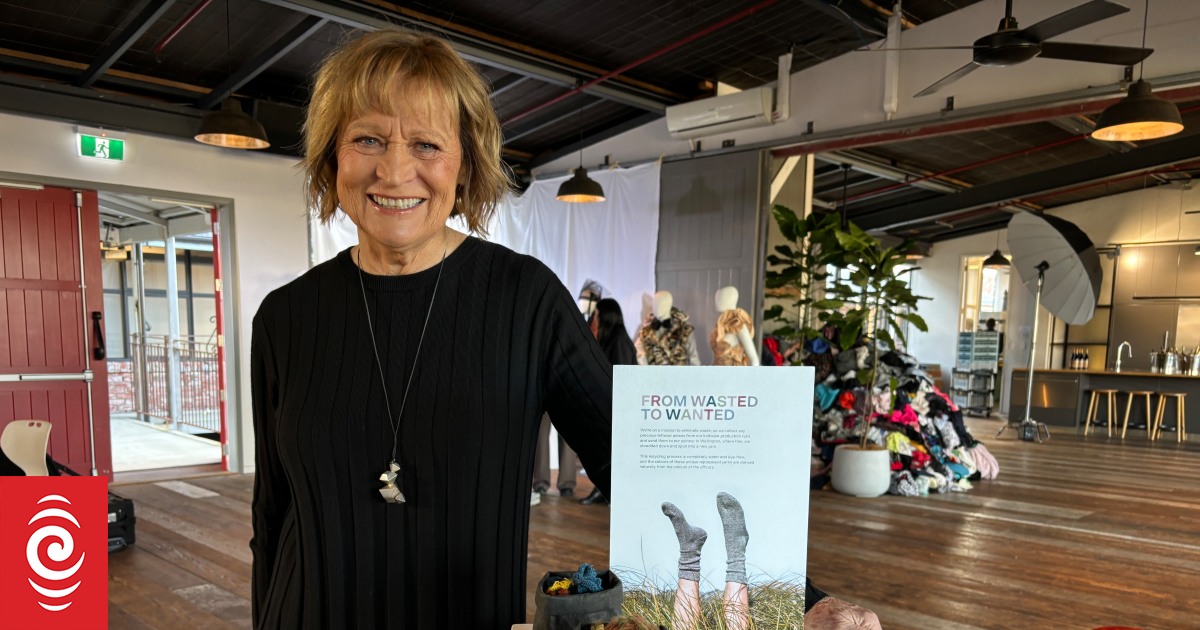
Founder of Untouched World Peri Drysdale standing next to the company’s Rubbish Socks which took home the circular business innovation award.
Photo: Davina Zimmer
The fashion industry says it cannot fix the massive problems it is facing alone, but getting the ear of the government is proving tricky.
Half a tonne of unwanted clothes dumped in the middle of a fashion event in Auckland this week is the brutal symbol of the crisis hanging over the industry.
More brutal is the fact that this half-tonne is sent to landfills in New Zealand every five minutes.
The pile was on display at the annual Circular Fashion Awards, run by the non-profit clothing and textiles collective Mindful Fashion. It aims to highlight the environmental damage caused by fast fashion and show off the work of designers, newcomers and veterans, who have come up with ways to reuse materials that would otherwise end up in our landfills.
According to a Threads of Tomorrow report on the value of the local fashion industry, over the last 20 years clothing consumption has soared by 60 percent with items kept only half as long as they were two decades ago.
The production, distribution and disposal of clothing and textiles is responsible for up to eight percent of global greenhouse gas emissions and contributes 52,000 tonnes of waste to annually.
The awards night brings attention to the growing issue but Juliet Hogan, the chair of Mindful Fashion and a leading designer, says government ministers have been slow or unwilling to respond.

This half a tonne of unwanted clothes dumped in the middle of the Circular Fashion Awards is the amount of textile waste sent to New Zealand landfills every five minutes
Photo: Davina Zimmer
She says she is finally meeting with the minister for commerce and consumer affairs Andrew Bayly after months of trying to get an appointment, while the women’s affairs minister Nicola Grigg has turned down meeting requests.
That is despite the fact the industry generated $7.8 billion, or 1.9 percent of GDP in 2023, according to the Threads report.
The industry is in trouble both environmentally and financially, Hogan says.
“We want the government to sit down and have a conversation with us about how we might work together to ensure that the right decisions are being made and the right steps are put into place to caretake both this industry and the textile waste problem that we will be experiencing over the coming years.
“This industry is at a critical turning point, we can’t fix it by ourselves, and we don’t want to fix it by ourselves. We need legislation and policy put in place so that we can ensure that all businesses that contribute to this industry are taking responsibility for what needs to happen.”
Hogan and other industry leaders are calling for a product stewardship scheme, or levy, targeting mass producers.
Mindful Fashion’s chief executive Jacinta FitzGerald tells The Detail the designs at the awards highlight creative ways to reduce waste.
“What we challenged entrants to do was to really make this a place-based problem solving exercise, to look around their local neighbourhoods and communities and identify a waste stream and then reimagine a waste stream into an outfit,” she says.
Entrants are also challenged to think about how their garment could be recycled and reused in the future.
But with global fast fashion giants such as Temu and Shein flooding the country, the awards have a comparatively small impact.
“We’re changing mindsets and we’re showing people what’s possible. We’re showing people that you could look at old sail cloths and they’re not just rubbish, they can actually be reimagined into something new,” she says.
A rain coat that was crafted from locally sourced sail-cloth waste won the award for material innovation for designer Sue Prescott.
It was one of four categories in the awards, which have a $50,000 prize pool.
Dame Theresa Gattung, whose Gattung Foundation is a major backer of the awards, says the industry should be celebrated for the thousands of women who work in it, and the creativity and skills they bring. She says it deserves the attention of ministers.
“Whoever’s the minister of whatever political stripe should look at the contribution to the economy and go, ‘why wouldn’t I take a meeting?'”
Check out how to listen to and follow The Detail here.
You can also stay up-to-date by liking us on Facebook or following us on Twitter.

